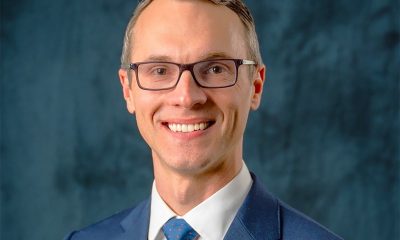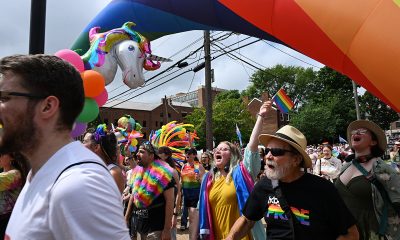homepage news
Danica Roem comes to Richmond
Transgender delegate welcomed with open arms on first day
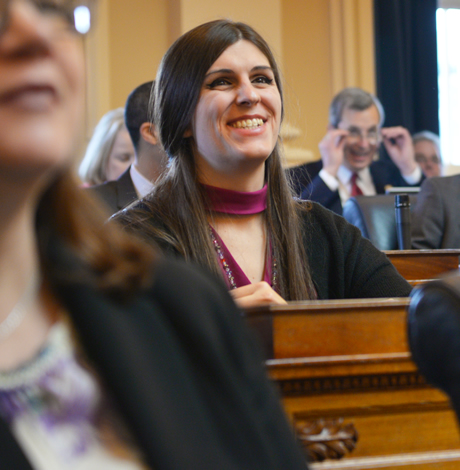
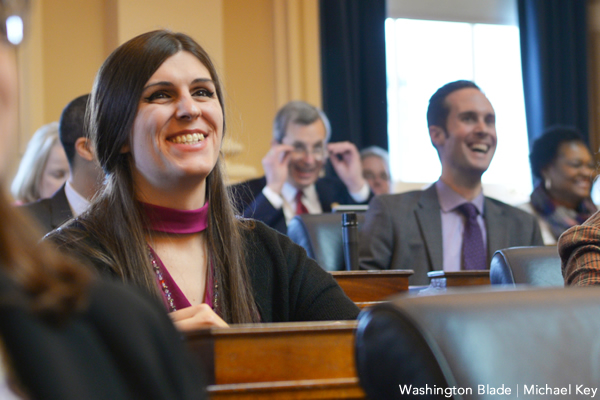
Virginia state Del. Danica Roem (D-Manassas) attends her first session in office in Richmond, Va., on Jan.
10, 2018. (Washington Blade photo by Michael Key)
RICHMOND, Va. — It was shortly before 10 a.m. on Wednesday when Danica Roem was adding additional language to her bill that would protect credentialed journalists from revealing their sources.
Two reporters and their respective photographers were in Roem’s small office on the second floor of the Pocahontas State Office Building near the Virginia Capitol as she worked on her personal laptop. A coffee mug from the Newseum in D.C., a copy of the 2018 budget bill and a name tag that identified her as “delegate-elect Danica Roem” had been placed on her desk before she arrived less than an hour before.
Roem pointed out to the reporters and two of her aides — Maria Salgado and Gabrielle Slais — that earlier in the day she was listening to “Bullet Ride” and “Pinball Map” from “Clayman,” an album that In Flames, a Swedish heavy metal band, released in 2000. Roem asked Slais whether her 9-year-old stepdaughter could bring her tablet into the chamber of the Virginia House of Delegates before she filed her bill.
The deadline for lawmakers to pre-file bills before the 2018 General Assembly began was 10 a.m.
Roem filed her bill at 10 a.m.
“That’s how we do things,” she joked.
She was sworn in slightly more than two hours later.
‘My job is to serve my constituents’
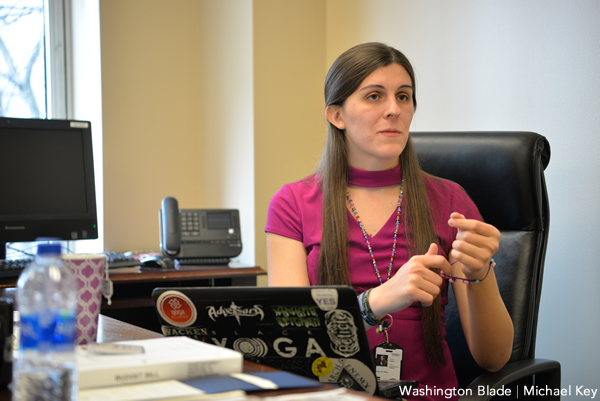
Virginia state Del. Danica Roem (D-Manassas) speaks with reporters in her office on Jan. 10, 2018. (Washington Blade photo by Michael Key)
Roem, a former journalist, last November defeated Bob Marshall, an anti-LGBT Republican who had represented the 13th District since 1992. Roem, who is a Democrat, is the first openly trans person seated in any state legislature in the U.S.
Althea Garrison in 1992 became the first trans person elected to a state legislature when she won a seat in the Massachusetts House of Representatives, but she did not publicly discuss her gender identity during her campaign. Stacie Laughton in 2012 became the first openly trans person elected to a state legislature when she won a seat in the New Hampshire House of Representatives, but she ended her bid to sit in the chamber after her convictions for credit card and identity fraud became public.
State Dels. Marcus Simon (D-Falls Church) and Richard “Rip” Sullivan (D-Fairfax County) are among those who stopped by Roem’s office on Wednesday. Roem’s former campaign manager, Ethan Damon, who is now her senior advisor, was with her throughout the day.
Salgado and Slais tried to get Roem to leave her office shortly before 11 a.m. in order to attend a House Democratic Caucus meeting. Roem quickly used the women’s restroom near a bank of elevators in the Pocahontas Building before she, her staff, the reporters and their photographers left walked across North Bank Street and entered the Capitol.
Marshall in 2017 introduced a bill that would have banned Roem and other trans people from using public bathrooms in Virginia that correspond with their gender identity. A House subcommittee killed it by a voice vote.
“My job is to never, ever discriminate against my constituents,” said Roem in her office before she walked to the Capitol. “My job is to serve my constituents and no one who lives in the 13th District should feel unwelcome to be there because of what they look like, where they come from, how they worship, who they love.”
“They should be celebrated, respected and welcomed because of who they are, not despite of it and not for what other people telling them what they should be,” she added. “I hope that what we’re doing today sends that message very loud and clear that you can succeed because of who you are, not despite it.”
Roem described as ‘a rock star’
Members of the House of Delegates — Democrats and Republicans — hugged Roem as she entered the House chamber shortly before noon. She walked to her desk and stood as more than half a dozen photographers from across the country took her picture.
Roem’s family was in the House gallery when she and the 14 other new delegates were sworn in. These include state Del. Dawn Adams (D-Richmond), who is the first out lesbian elected to the Virginia General Assembly.
State Sen. Adam Ebbin (D-Alexandria) and state Dels. Mark Levine (D-Alexandria) and Mark Sickles (D-Fairfax County) are openly gay.
“Dawn and I both made history,” said Roem before leaving her office, noting that Adams is her roommate during session. “This is not just one of us here.”
Roem on Wednesday wore around her neck a rainbow-colored lanyard for her General Assembly badge that her stepdaughter gave her for Christmas. She also held her trademark rainbow headscarf in her left hand when she was sworn in.
Roem was wearing the headscarf a few hours later when outgoing Gov. Terry McAuliffe delivered his final State of the Commonwealth speech.
Roem told the Blade during an impromptu interview on the House floor shortly after 3:30 p.m. that she decided she would leave the headscarf on her desk when she was not in the chamber so “our LGBTQ community knows we’re hand in hand on the floor of the House of Delegates. Former House Speaker Richard Cranwell and his wife, House Minority Leader David Toscano (D-Charlottesville), Sickles and two House staffers all approached Roem and began speaking with her.
“My very presence in this body is the statement,” said Roem.
Toscano described Roem to the Blade as a “rock star” before he left the chamber.
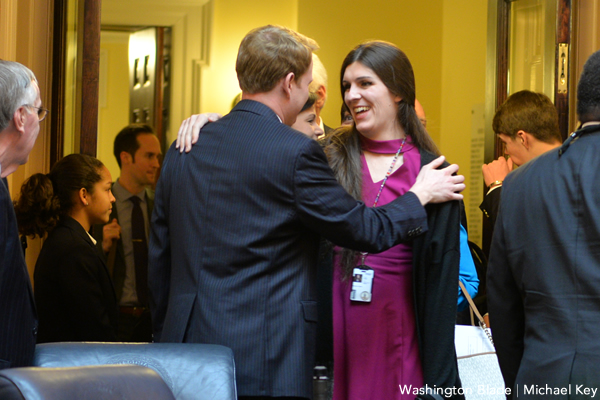
State Del. Danica Roem (D-Manassas) greets state Del. Chris Hurst (D-Blacksburg) on the floor of the Virginia House of Delegates on Jan. 10, 2018. (Washington Blade photo by Michael Key)
Route 28, FOIA among early legislative priorities
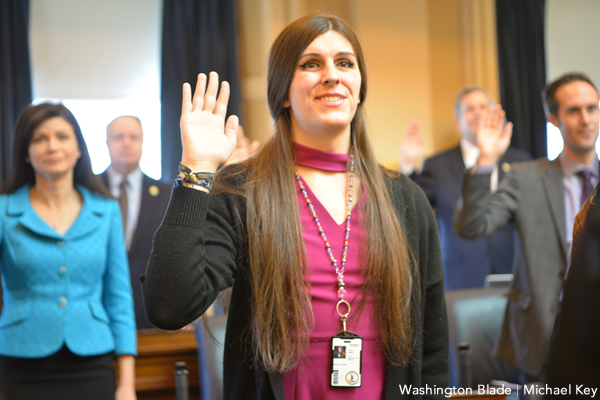
Danica Roem was sworn in on Jan. 10. (Washington Blade photo by Michael Key)
Improving Route 28 in order to reduce traffic congestion and extending the Virginia Railway Express commuter trains to Innovation Technology Park as a way to bolster the area’s high-tech industry are among the issues on which she campaigned.
Roem on Monday introduced two resolutions that call upon the Virginia Department of Transportation to study ways to improve Route 28 and expand and maintain commuter trains in the state. One of the bills that Roem filed before Wednesday would require the attorney general’s office to create an ombudsman to ensure state agencies comply with Freedom of Information Act requests.
Roem has requested to be assigned to the Transportation; General Laws and Counties, Cities and Towns Committee.
The General Laws Committee typically considers LGBT-specific bills.
Roem told the Blade on the House floor that it is “really tough for me to get on” the committee. She nevertheless said it is “important.”
“FOIA goes through there and second nondiscrimination and discrimination goes through there,” said Roem. “I’m really big on the idea that a trans woman should be on a committee that deals with LGBTQ discrimination issues.”
“I believe strongly that if you’re going to vote on an issue that discriminates against one of your colleagues than you have to look your colleague in the eye while you’re presenting that bill,” she added.
Roem on Friday tweeted she has been assigned to the Counties, Cities and Towns and Science and Technology Committees.
“Of course I’m disappointed I won’t be on the Transportation Committee but I’ll do my best to represent HD13 on these committees,” she wrote. “It’s an honor to even be here, above all else.”
Roem receives well-wishes from trans girl’s mother
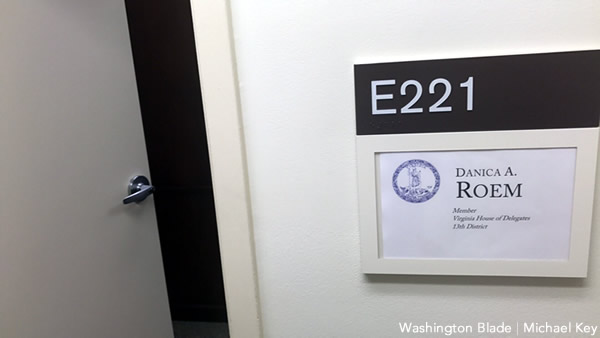
(Washington Blade photo by Michael Key)
Roem on Wednesday did not speak on the floor of the House, which Republicans control by a 51-49 vote margin.
The House voted unanimously to elect state Del. M. Kirkland Cox (R-Colonial Heights) as their next speaker. It also voted to record subcommittee votes during the 2018 session.
“That’s a win for transparency advocates,” said Roem.
Cox has said he would stop the tradition of using gender-specific titles to refer to lawmakers if he were to become speaker. A woman with whom the Blade spoke in the Pocahontas Building on Wednesday used an expletive when she said Cox should refer to Roem as the “gentlewoman from Manassas” when he acknowledges her on the House floor.
“It is really obnoxious to have that be the lead question for two days in a row when I’m trying to deal with serious public policy,” Roem told the Blade on Thursday during a phone call.
She said in her office on Wednesday before she was sworn in that her election proved trans people can win elections in spite of their gender identity. Roem also showed the Blade a text message she received from the mother of an 11-year-old trans girl in Roanoke earlier in the day.
The mother told Roem that she has inspired her daughter. She also wished her well on her first day in office.
“Here we are; Room 221; Pocahontas Building,” said Roem. “To have had the number of trans kids reach out to me and people who desperately needed someone to champion what they believe in, especially what happened in 2016, this is special.”
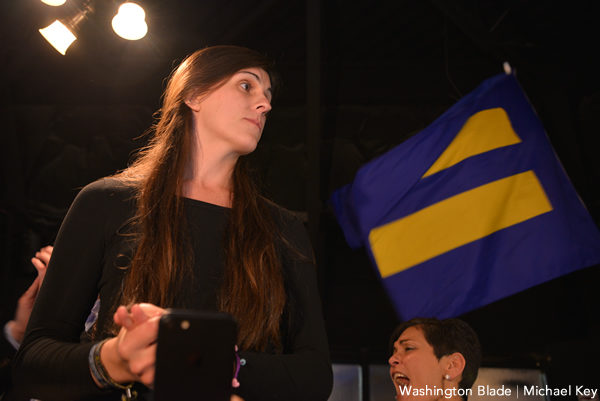
homepage news
Honoring the legacy of New Orleans’ 1973 UpStairs Lounge fire
Why the arson attack that killed 32 gay men still resonates 50 years later

On June 23 of last year, I held the microphone as a gay man in the New Orleans City Council Chamber and related a lost piece of queer history to the seven council members. I told this story to disabuse all New Orleanians of the notion that silence and accommodation, in the face of institutional and official failures, are a path to healing.
The story I related to them began on a typical Sunday night at a second-story bar on the fringe of New Orleans’ French Quarter in 1973, where working-class men would gather around a white baby grand piano and belt out the lyrics to a song that was the anthem of their hidden community, “United We Stand” by the Brotherhood of Man.
“United we stand,” the men would sing together, “divided we fall” — the words epitomizing the ethos of their beloved UpStairs Lounge bar, an egalitarian free space that served as a forerunner to today’s queer safe havens.
Around that piano in the 1970s Deep South, gays and lesbians, white and Black queens, Christians and non-Christians, and even early gender minorities could cast aside the racism, sexism, and homophobia of the times to find acceptance and companionship for a moment.
For regulars, the UpStairs Lounge was a miracle, a small pocket of acceptance in a broader world where their very identities were illegal.
On the Sunday night of June 24, 1973, their voices were silenced in a murderous act of arson that claimed 32 lives and still stands as the deadliest fire in New Orleans history — and the worst mass killing of gays in 20th century America.
As 13 fire companies struggled to douse the inferno, police refused to question the chief suspect, even though gay witnesses identified and brought the soot-covered man to officers idly standing by. This suspect, an internally conflicted gay-for-pay sex worker named Rodger Dale Nunez, had been ejected from the UpStairs Lounge screaming the word “burn” minutes before, but New Orleans police rebuffed the testimony of fire survivors on the street and allowed Nunez to disappear.
As the fire raged, police denigrated the deceased to reporters on the street: “Some thieves hung out there, and you know this was a queer bar.”
For days afterward, the carnage met with official silence. With no local gay political leaders willing to step forward, national Gay Liberation-era figures like Rev. Troy Perry of the Metropolitan Community Church flew in to “help our bereaved brothers and sisters” — and shatter officialdom’s code of silence.
Perry broke local taboos by holding a press conference as an openly gay man. “It’s high time that you people, in New Orleans, Louisiana, got the message and joined the rest of the Union,” Perry said.
Two days later, on June 26, 1973, as families hesitated to step forward to identify their kin in the morgue, UpStairs Lounge owner Phil Esteve stood in his badly charred bar, the air still foul with death. He rebuffed attempts by Perry to turn the fire into a call for visibility and progress for homosexuals.
“This fire had very little to do with the gay movement or with anything gay,” Esteve told a reporter from The Philadelphia Inquirer. “I do not want my bar or this tragedy to be used to further any of their causes.”
Conspicuously, no photos of Esteve appeared in coverage of the UpStairs Lounge fire or its aftermath — and the bar owner also remained silent as he witnessed police looting the ashes of his business.
“Phil said the cash register, juke box, cigarette machine and some wallets had money removed,” recounted Esteve’s friend Bob McAnear, a former U.S. Customs officer. “Phil wouldn’t report it because, if he did, police would never allow him to operate a bar in New Orleans again.”
The next day, gay bar owners, incensed at declining gay bar traffic amid an atmosphere of anxiety, confronted Perry at a clandestine meeting. “How dare you hold your damn news conferences!” one business owner shouted.
Ignoring calls for gay self-censorship, Perry held a 250-person memorial for the fire victims the following Sunday, July 1, culminating in mourners defiantly marching out the front door of a French Quarter church into waiting news cameras. “Reverend Troy Perry awoke several sleeping giants, me being one of them,” recalled Charlene Schneider, a lesbian activist who walked out of that front door with Perry.

Esteve doubted the UpStairs Lounge story’s capacity to rouse gay political fervor. As the coroner buried four of his former patrons anonymously on the edge of town, Esteve quietly collected at least $25,000 in fire insurance proceeds. Less than a year later, he used the money to open another gay bar called the Post Office, where patrons of the UpStairs Lounge — some with visible burn scars — gathered but were discouraged from singing “United We Stand.”
New Orleans cops neglected to question the chief arson suspect and closed the investigation without answers in late August 1973. Gay elites in the city’s power structure began gaslighting the mourners who marched with Perry into the news cameras, casting suspicion on their memories and re-characterizing their moment of liberation as a stunt.
When a local gay journalist asked in April 1977, “Where are the gay activists in New Orleans?,” Esteve responded that there were none, because none were needed. “We don’t feel we’re discriminated against,” Esteve said. “New Orleans gays are different from gays anywhere else… Perhaps there is some correlation between the amount of gay activism in other cities and the degree of police harassment.”

An attitude of nihilism and disavowal descended upon the memory of the UpStairs Lounge victims, goaded by Esteve and fellow gay entrepreneurs who earned their keep via gay patrons drowning their sorrows each night instead of protesting the injustices that kept them drinking.
Into the 1980s, the story of the UpStairs Lounge all but vanished from conversation — with the exception of a few sanctuaries for gay political debate such as the local lesbian bar Charlene’s, run by the activist Charlene Schneider.
By 1988, the 15th anniversary of the fire, the UpStairs Lounge narrative comprised little more than a call for better fire codes and indoor sprinklers. UpStairs Lounge survivor Stewart Butler summed it up: “A tragedy that, as far as I know, no good came of.”
Finally, in 1991, at Stewart Butler and Charlene Schneider’s nudging, the UpStairs Lounge story became aligned with the crusade of liberated gays and lesbians seeking equal rights in Louisiana. The halls of power responded with intermittent progress. The New Orleans City Council, horrified by the story but not yet ready to take its look in the mirror, enacted an anti-discrimination ordinance protecting gays and lesbians in housing, employment, and public accommodations that Dec. 12 — more than 18 years after the fire.
“I believe the fire was the catalyst for the anger to bring us all to the table,” Schneider told The Times-Picayune, a tacit rebuke to Esteve’s strategy of silent accommodation. Even Esteve seemed to change his stance with time, granting a full interview with the first UpStairs Lounge scholar Johnny Townsend sometime around 1989.
Most of the figures in this historic tale are now deceased. What’s left is an enduring story that refused to go gently. The story now echoes around the world — a musical about the UpStairs Lounge fire recently played in Tokyo, translating the gay underworld of the 1973 French Quarter for Japanese audiences.
When I finished my presentation to the City Council last June, I looked up to see the seven council members in tears. Unanimously, they approved a resolution acknowledging the historic failures of city leaders in the wake of the UpStairs Lounge fire.
Council members personally apologized to UpStairs Lounge families and survivors seated in the chamber in a symbolic act that, though it could not bring back those who died, still mattered greatly to those whose pain had been denied, leaving them to grieve alone. At long last, official silence and indifference gave way to heartfelt words of healing.
The way Americans remember the past is an active, ongoing process. Our collective memory is malleable, but it matters because it speaks volumes about our maturity as a people, how we acknowledge the past’s influence in our lives, and how it shapes the examples we set for our youth. Do we grapple with difficult truths, or do we duck accountability by defaulting to nostalgia and bluster? Or worse, do we simply ignore the past until it fades into a black hole of ignorance and indifference?
I believe that a factual retelling of the UpStairs Lounge tragedy — and how, 50 years onward, it became known internationally — resonates beyond our current divides. It reminds queer and non-queer Americans that ignoring the past holds back the present, and that silence is no cure for what ails a participatory nation.
Silence isolates. Silence gaslights and shrouds. It preserves the power structures that scapegoat the disempowered.
Solidarity, on the other hand, unites. Solidarity illuminates a path forward together. Above all, solidarity transforms the downtrodden into a resounding chorus of citizens — in the spirit of voices who once gathered ‘round a white baby grand piano and sang, joyfully and loudly, “United We Stand.”

Robert W. Fieseler is a New Orleans-based journalist and the author of “Tinderbox: the Untold Story of the Up Stairs Lounge Fire and the Rise of Gay Liberation.”
homepage news
New Supreme Court term includes critical LGBTQ case with ‘terrifying’ consequences
Business owner seeks to decline services for same-sex weddings

The U.S. Supreme Court, after a decision overturning Roe v. Wade that still leaves many reeling, is starting a new term with justices slated to revisit the issue of LGBTQ rights.
In 303 Creative v. Elenis, the court will return to the issue of whether or not providers of custom-made goods can refuse service to LGBTQ customers on First Amendment grounds. In this case, the business owner is Lorie Smith, a website designer in Colorado who wants to opt out of providing her graphic design services for same-sex weddings despite the civil rights law in her state.
Jennifer Pizer, acting chief legal officer of Lambda Legal, said in an interview with the Blade, “it’s not too much to say an immeasurably huge amount is at stake” for LGBTQ people depending on the outcome of the case.
“This contrived idea that making custom goods, or offering a custom service, somehow tacitly conveys an endorsement of the person — if that were to be accepted, that would be a profound change in the law,” Pizer said. “And the stakes are very high because there are no practical, obvious, principled ways to limit that kind of an exception, and if the law isn’t clear in this regard, then the people who are at risk of experiencing discrimination have no security, no effective protection by having a non-discrimination laws, because at any moment, as one makes their way through the commercial marketplace, you don’t know whether a particular business person is going to refuse to serve you.”
The upcoming arguments and decision in the 303 Creative case mark a return to LGBTQ rights for the Supreme Court, which had no lawsuit to directly address the issue in its previous term, although many argued the Dobbs decision put LGBTQ rights in peril and threatened access to abortion for LGBTQ people.
And yet, the 303 Creative case is similar to other cases the Supreme Court has previously heard on the providers of services seeking the right to deny services based on First Amendment grounds, such as Masterpiece Cakeshop and Fulton v. City of Philadelphia. In both of those cases, however, the court issued narrow rulings on the facts of litigation, declining to issue sweeping rulings either upholding non-discrimination principles or First Amendment exemptions.
Pizer, who signed one of the friend-of-the-court briefs in opposition to 303 Creative, said the case is “similar in the goals” of the Masterpiece Cakeshop litigation on the basis they both seek exemptions to the same non-discrimination law that governs their business, the Colorado Anti-Discrimination Act, or CADA, and seek “to further the social and political argument that they should be free to refuse same-sex couples or LGBTQ people in particular.”
“So there’s the legal goal, and it connects to the social and political goals and in that sense, it’s the same as Masterpiece,” Pizer said. “And so there are multiple problems with it again, as a legal matter, but also as a social matter, because as with the religion argument, it flows from the idea that having something to do with us is endorsing us.”
One difference: the Masterpiece Cakeshop litigation stemmed from an act of refusal of service after owner, Jack Phillips, declined to make a custom-made wedding cake for a same-sex couple for their upcoming wedding. No act of discrimination in the past, however, is present in the 303 Creative case. The owner seeks to put on her website a disclaimer she won’t provide services for same-sex weddings, signaling an intent to discriminate against same-sex couples rather than having done so.
As such, expect issues of standing — whether or not either party is personally aggrieved and able bring to a lawsuit — to be hashed out in arguments as well as whether the litigation is ripe for review as justices consider the case. It’s not hard to see U.S. Chief Justice John Roberts, who has sought to lead the court to reach less sweeping decisions (sometimes successfully, and sometimes in the Dobbs case not successfully) to push for a decision along these lines.
Another key difference: The 303 Creative case hinges on the argument of freedom of speech as opposed to the two-fold argument of freedom of speech and freedom of religious exercise in the Masterpiece Cakeshop litigation. Although 303 Creative requested in its petition to the Supreme Court review of both issues of speech and religion, justices elected only to take up the issue of free speech in granting a writ of certiorari (or agreement to take up a case). Justices also declined to accept another question in the petition request of review of the 1990 precedent in Smith v. Employment Division, which concluded states can enforce neutral generally applicable laws on citizens with religious objections without violating the First Amendment.
Representing 303 Creative in the lawsuit is Alliance Defending Freedom, a law firm that has sought to undermine civil rights laws for LGBTQ people with litigation seeking exemptions based on the First Amendment, such as the Masterpiece Cakeshop case.
Kristen Waggoner, president of Alliance Defending Freedom, wrote in a Sept. 12 legal brief signed by her and other attorneys that a decision in favor of 303 Creative boils down to a clear-cut violation of the First Amendment.
“Colorado and the United States still contend that CADA only regulates sales transactions,” the brief says. “But their cases do not apply because they involve non-expressive activities: selling BBQ, firing employees, restricting school attendance, limiting club memberships, and providing room access. Colorado’s own cases agree that the government may not use public-accommodation laws to affect a commercial actor’s speech.”
Pizer, however, pushed back strongly on the idea a decision in favor of 303 Creative would be as focused as Alliance Defending Freedom purports it would be, arguing it could open the door to widespread discrimination against LGBTQ people.
“One way to put it is art tends to be in the eye of the beholder,” Pizer said. “Is something of a craft, or is it art? I feel like I’m channeling Lily Tomlin. Remember ‘soup and art’? We have had an understanding that whether something is beautiful or not is not the determining factor about whether something is protected as artistic expression. There’s a legal test that recognizes if this is speech, whose speech is it, whose message is it? Would anyone who was hearing the speech or seeing the message understand it to be the message of the customer or of the merchants or craftsmen or business person?”
Despite the implications in the case for LGBTQ rights, 303 Creative may have supporters among LGBTQ people who consider themselves proponents of free speech.
One joint friend-of-the-court brief before the Supreme Court, written by Dale Carpenter, a law professor at Southern Methodist University who’s written in favor of LGBTQ rights, and Eugene Volokh, a First Amendment legal scholar at the University of California, Los Angeles, argues the case is an opportunity to affirm the First Amendment applies to goods and services that are uniquely expressive.
“Distinguishing expressive from non-expressive products in some contexts might be hard, but the Tenth Circuit agreed that Smith’s product does not present a hard case,” the brief says. “Yet that court (and Colorado) declined to recognize any exemption for products constituting speech. The Tenth Circuit has effectively recognized a state interest in subjecting the creation of speech itself to antidiscrimination laws.”
Oral arguments in the case aren’t yet set, but may be announced soon. Set to defend the state of Colorado and enforcement of its non-discrimination law in the case is Colorado Solicitor General Eric Reuel Olson. Just this week, the U.S. Supreme Court announced it would grant the request to the U.S. solicitor general to present arguments before the justices on behalf of the Biden administration.
With a 6-3 conservative majority on the court that has recently scrapped the super-precedent guaranteeing the right to abortion, supporters of LGBTQ rights may think the outcome of the case is all but lost, especially amid widespread fears same-sex marriage would be next on the chopping block. After the U.S. Tenth Circuit Court of Appeals ruled against 303 Creative in the lawsuit, the simple action by the Supreme Court to grant review in the lawsuit suggests they are primed to issue a reversal and rule in favor of the company.
Pizer, acknowledging the call to action issued by LGBTQ groups in the aftermath of the Dobbs decision, conceded the current Supreme Court issuing the ruling in this case is “a terrifying prospect,” but cautioned the issue isn’t so much the makeup of the court but whether or not justices will continue down the path of abolishing case law.
“I think the question that we’re facing with respect to all of the cases or at least many of the cases that are in front of the court right now, is whether this court is going to continue on this radical sort of wrecking ball to the edifice of settled law and seemingly a goal of setting up whole new structures of what our basic legal principles are going to be. Are we going to have another term of that?” Pizer said. “And if so, that’s terrifying.”
homepage news
Kelley Robinson, a Black, queer woman, named president of Human Rights Campaign
Progressive activist a veteran of Planned Parenthood Action Fund

Kelley Robinson, a Black, queer woman and veteran of Planned Parenthood Action Fund, is to become the next president of the Human Rights Campaign, the nation’s leading LGBTQ group announced on Tuesday.
Robinson is set to become the ninth president of the Human Rights Campaign after having served as executive director of Planned Parenthood Action Fund and more than 12 years of experience as a leader in the progressive movement. She’ll be the first Black, queer woman to serve in that role.
“I’m honored and ready to lead HRC — and our more than three million member-advocates — as we continue working to achieve equality and liberation for all Lesbian, Gay, Bisexual, Transgender, and Queer people,” Robinson said. “This is a pivotal moment in our movement for equality for LGBTQ+ people. We, particularly our trans and BIPOC communities, are quite literally in the fight for our lives and facing unprecedented threats that seek to destroy us.”
The next Human Rights Campaign president is named as Democrats are performing well in polls in the mid-term elections after the U.S. Supreme Court overturned Roe v. Wade, leaving an opening for the LGBTQ group to play a key role amid fears LGBTQ rights are next on the chopping block.
“The overturning of Roe v. Wade reminds us we are just one Supreme Court decision away from losing fundamental freedoms including the freedom to marry, voting rights, and privacy,” Robinson said. “We are facing a generational opportunity to rise to these challenges and create real, sustainable change. I believe that working together this change is possible right now. This next chapter of the Human Rights Campaign is about getting to freedom and liberation without any exceptions — and today I am making a promise and commitment to carry this work forward.”
The Human Rights Campaign announces its next president after a nearly year-long search process after the board of directors terminated its former president Alphonso David when he was ensnared in the sexual misconduct scandal that led former New York Gov. Andrew Cuomo to resign. David has denied wrongdoing and filed a lawsuit against the LGBTQ group alleging racial discrimination.

-

 U.S. Supreme Court1 day ago
U.S. Supreme Court1 day agoSupreme Court to consider bans on trans athletes in school sports
-

 Out & About1 day ago
Out & About1 day agoCelebrate the Fourth of July the gay way!
-

 Maryland4 days ago
Maryland4 days agoSilver Spring holds annual Pride In The Plaza
-

 Opinions4 days ago
Opinions4 days agoSupreme Court decision on opt outs for LGBTQ books in classrooms will likely accelerate censorship



